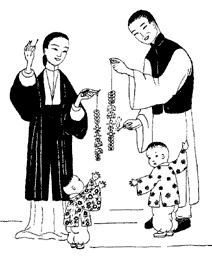Qingming Festival
The Chinese Qingming Festival ( Chinese 清明節 / 清明节 , Pinyin qīngmíngjié , from 清明 , qīngmíng - "bright and clear") on April 4th or 5th, rarely on April 6th, is the Chinese festival of the dead. The Chinese feast of the dead falls on the 106th day according to the Chinese solar calendar (peasant calendar) , 15 days after the spring equinox ( 春分 , chūnfēn - "mid-spring").
The graves are swept, food, flowers and objects that the deceased liked during their lifetime are placed in front of the graves, incense sticks are lit and death-money is burned. In the south, in the Cantonese-speaking part of China, you can see many traders on the streets at this time, who in addition to paper money also sell cars, suits and shoes made of paper that are burned for this purpose. The burned things should be available to the ancestors and should make them friendly towards their descendants, whose destinies they guide. On this day, many Chinese only eat cold foods.
Around the time of Qingming Festival, temperatures rise and rain more frequently, which is favorable for sowing.
April 4th has played an important role in China's recent history. During the Cultural Revolution , the April 4th Movement used the day to criticize the gang of four with open grief over the death of longtime Prime Minister Zhou Enlai . The festival has been an official holiday in the People's Republic of China since 2008 . In this way the socialist state ties in with tradition. In the Republic of China (Taiwan) , the day is also a public holiday, which often coincides with the death of long-time head of state Chiang Kaishek (April 5, 1975).
See also
Individual evidence
- ↑ Peter Hessler; River town , Harper Collins (2001).
- ↑ Qingmíng jie , China Daily (April 4, 2009).
